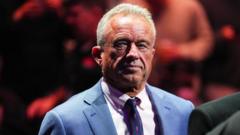As President-elect Trump’s nominee for the Department of Health and Human Services, RFK Jr. vows to combat ultra-processed foods and harmful additives impacting the nation’s health. Despite some expert support, his approach raises questions regarding feasibility and political opposition from the food industry.**
RFK Jr.'s Mission for a Healthier America: Can He Transform the Food Landscape?**

RFK Jr.'s Mission for a Healthier America: Can He Transform the Food Landscape?**
Robert F. Kennedy Jr. aims to revolutionize American diets by addressing concerns over processed foods and additives, but faces skepticism and political hurdles.**
Robert F. Kennedy Jr. is stepping into the limelight with a goal that resonates with many health-conscious Americans: a healthier diet free from harmful additives and ultra-processed foods. As the nominee for the Department of Health and Human Services (DHHS) under President-elect Donald Trump, Kennedy has pledged to tackle issues ranging from the food dyes in cereals to seed oils used in popular fast foods.
At a recent rally, Kennedy voiced his commitment to tackling what he perceives as harmful food practices, stating, "We are betraying our children by letting industries poison them." This declaration reflects his long-standing criticism of ingredients he believes detrimentally impact public health. However, his path forward is riddled with challenges, particularly from entrenched interests within the food industry.
Kennedy's appointment is generating mixed reactions, with some public health advocates backing his potential reforms while others remain skeptical. Marion Nestle, a former NYU nutrition professor, pointed out the significant hurdles he will encounter, especially in reconciling his vision with the realities of the powerful food lobby. As Kennedy aims to reform the Food and Drug Administration (FDA)—an agency tasked with safeguarding the nation's food supply—many wonder whether he can effectively navigate the political landscape.
A notable focal point of Kennedy’s agenda is the elimination of ultra-processed foods, such as sugary cereals, frozen pizzas, and chicken nuggets, which are linked with rising chronic illnesses in the U.S. "We have a generation swimming around in a toxic soup right now," he stated, emphasizing the need for immediate intervention, particularly in school nutrition programs.
Experts are divided on Kennedy's proposals. While some laud his initiative to restrict harmful additives, including several food dyes currently under scrutiny, others caution against other controversial stances he has taken, such as opposing fluoride in drinking water, which has historically been linked to improved dental health. Additionally, while claiming seed oils contribute to rising obesity rates, critics argue there is no scientific basis for this assertion.
However, Kennedy’s approach does find allies; Colorado Democratic Governor Jared Polis indicated potential support by welcoming his nomination on social media. Yet, he clarified that any health policies must be firmly grounded in scientific evidence.
Political analysts note that Kennedy's ambitious plans hinge not only on his ability to influence food regulations but also on garnering support from an administration historically less inclined to endorse stringent health policies. Previous efforts to roll back nutritional guidelines in schools during Trump's first term exemplify the complex dynamics Kennedy will need to navigate.
The FDA is not the sole regulatory body overseeing food safety; the United States Department of Agriculture also plays a significant role, making comprehensive reform a more intricate task than a simple overhaul of agency personnel. Observers are wary of the potential backlash from the food industry, historically resistant to sweeping changes, especially those they perceive as threatening to their operations.
Ultimately, the success of RFK Jr.'s vision for a healthier America will depend on his ability to engage with industry stakeholders while maintaining a focus on public health. As he prepares for Senate confirmation, the questions surrounding his strategy add layers of complexity to an already charged discourse on America's food system. Political rhetoric aside, translating ideals into actionable policy will be his greatest challenge, and one that will require both political acumen and collaboration with various stakeholders in the health sector.




















